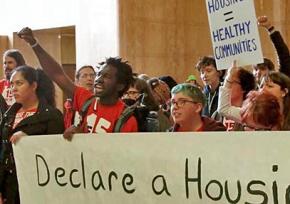Oregon’s low-wage emergency
, chief petitioner for the $15-an-hour minimum wage ballot initiative in Oregon, reports on demonstrations at the state Capitol.
CHANTING "EMERGENCY! Emergency! High rents and low wages!" dozens of protesters supporting a $15 minimum wage swarmed the Oregon Capitol building in Salem on February 18, simultaneously unfurling banners and raising a ruckus in the Senate, the House and the governor's office.
Legislators were angered and fearful, according to news reports. "Why don't you get a job?" yelled one. "Why don't you do your job?" a 15 Now activist yelled back. "It was a very dramatic shock-and-awe experience," Senate President Peter Courtney told the Oregonian. "It really frightened a lot of legislators."
Prior to the disruptions by activists, the House was debating a watered-down version of a bill to raise the state minimum wage. Both chambers are also considering bills that would provide weak protections for tenants facing exploding rents and no-cause evictions.
Some 25 protesters locked arms and began a sit-in of Gov. Kate Brown's office, demanding that she declare a housing state of emergency, like those declared in the cities of Portland and Eugene. Emergency declarations allow the suspension of local ordinances, such as anti-camping or building codes.

Protesters brought several more demands to the governor, including rent control, a $15-an-hour state minimum wage, local option minimum wages, and an end to no-cause evictions and sweeps of homeless encampments.
Before dropping a banner that read "Housing SOS: Fight High Rents and Low Wages" inside the Capitol chambers and taking part in the sit-in, which ended without arrest, activists set up a tent city on the Capitol steps.
Housing rights groups Right 2 Survive and Hazelnut Grove organized the tent city and were joined by activists from 15 Now, Portland Tenants United, Don't Shoot Portland, Jobs with Justice and the Portland State University Student Union. A crowd gathered to listen to tenants, low-wage workers, students and the homeless call out the legislature and governor for their feeble response to Oregon's economic crisis.
At one point in the disruptions, a group of protesters tried to rush the House chamber but were kept out by state troopers, who locked the doors. Activists then began pounding on the doors with their hands and shoes. "Inside, a noise like low, rolling thunder drowned out lawmakers' floor speeches," reported the Oregonian. "[R]epresentatives nervously milled around like penned livestock."
After the protesters left, the House passed a raise in the minimum wage, which although not $15 an hour for the whole state, will give Oregon the highest minimum wage in the nation. The three-tiered law will give the Portland metro area $14.75 by 2022, with other cities in the state getting $13.50 and rural areas $12.50.
While 15 Now protesters called the new law "too low, too slow," they also pointed out that it wouldn't have happened at all had it not been for activism demanding a $15 minimum wage.
Since the founding of Oregon's 15 Now in Portland two years ago, a series of rallies, marches, occupations, packed hearings, hard-nosed lobbying and an initiative petition, which collected close to 40,000 signatures over six months, helped propelled the urgency of the Fight for 15 onto the legislative docket.
Business groups and Democratic Party leaders repeatedly warned that voters would pass the statewide $15 ballot measure if the House and Senate didn't act.


